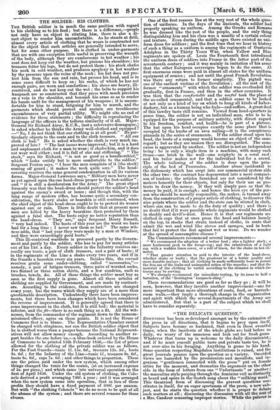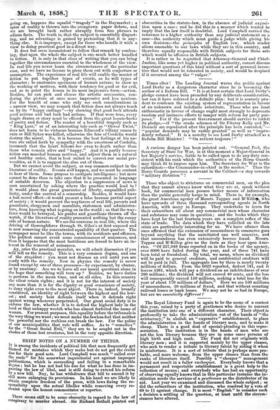"THE DELICATE QUESTION."
DISCUSSION has been so developed amongst us by the extension of the press in all directions, that it begins to prey upon itself. Subjects have become so haeknied, that even in these eventful times, when the incidents of the whole globe are laid before us daily, we weary of the sameness and look out for fresh game Whatever that turns up is welcome to the daily discussionist; and if he must consult public taste and private taste too, he is not over-nice in his foraging. Anything is game to his hand. Some question respecting Magdalen institutions is raised, and the great Journals pounce upon the cluestion as a variety. Onesided views are hazarded by the precisionists and moralists, and in- genious "gentlemen connected with the press" pia on female attire for the moment, and dramatize the argument on the other side in the form of letters from one " Unfortunate " or another ; the masculine style peeping through the feminine veil as distinctly as beard and spurs in the Scotch song about the "milking maid."' This theatrical form of discussing the gravest questions con- stitutes in itself, for an eager sportsman of the press, a new sub- ject, and he starts the question whether it is proper to debate such matters at all ; discussing the discussion with all the zest of a Mrs. Candour censuring improper stories. While the palaver is
going on, happens the squalid " tragedy " in the Haymarket; a spice of reality is thrown into the overgrown paper debate, and we are brought back rather abruptly from fine phrases to odious facts. The truth is, that the subject is essentially disgust- ing, and no advantage is gained by pretending that it is any- thing else. It is improper, except for those who handle it with a view to doing practical good in a direct way.
It does but seem inconsistent to follow that remark by confess- ing, that upon the whole the subject is one much better handled in fiction. It is only in that class of writing that you can bring together the circumstances essential to the wholeness of the view. In real life you never learn the circumstances of the particular case, and we have no licence to piece them out with conjecture or assumption. The experience of real life will enable the master of fiction to put together types of events, as he will types of character ; to anatomize specimens of human nature; to show us the working of motives, with their tendency for good or for evil, and so to point the lesson in its most impressive form—action.
Besides, he can pick and choose the artistic accessories, ren- dering the picture at once more impressive and less noxious.
For the benefit of some who only see such considerations in a narrow view, we may remark that fiction does not always teach us by its "happy endings "—by showing that good luck attends good actions and bad luck bad actions. If that were true, every tragic drama or story must be effaced from the great lesson-books of poetry and fiction. The reader of a beautiful tragedy such as "Ring Lear," or of an interesting tale such as "Oliver Twist," does not learn to be virtuous because Edmund's villany comes to ruin or Bill Sykes was killed, otherwise the fate of Cordelia would
destroy the moral. No, it is because the best feelings of his na-, tare are called forth by sympathy with the sweetness of Cordelia,
insomuch that the heart follows her even to death rather than those who remain alive and "happy." And it is partly because fiction can marshal human motives, and adjust them in a natural and healthy order, that is best suited to correct our social per- versities, as it is to suggest the clue out of them. But we cannot avoid the subject, or any common subject in the literature of reality. Events will happen, and we must be content to hear of them. Some propose to castigate intelligence ; but more cannot be done than to take care that it be presented in language of suitable decorum. The objection to a suppression of news is soon ascertained by asking where the practice would lead to ? It would place the great guarantee of liberty, unqualified pub- licity, under the control of a censorship. Besides, it would have a bad moral effect—it would present a false because partial aspect of society ; it would prevent the wayfarers of real life, parents and guardians, clergymen and moralists, statesmen and administra- tors, from knowing what is going on in the world ; so that the way- farer would be betrayed, his guides and guardians thrown off the watch, if the literature of reality presented nothing but the sunny side of human nature. We see the converse in real life, where the driving of thoroughfares through St. Giles's at first exposed and is now removing the concentrated squalidity of that quarter. The newspaper must be like the towns, with its accidents and offences. The politest cannot avoid some consciousness of nuisances, and thus it happens that the most fastidious are forced to have an in- terest in the removal of nuisances.
Ay, cries the practical moralist, we will admit discussion if you will tell us the remedy. This is a very common dogma, and one of the stupidest : you must not discuss an evil until you are ready with the remedy. Now in physics the remedy is never found except by one of three processes—by experiment, by chance, or by anatomy. Are we to leave all our moral questions alone in the hope that something will turn up ? Besides, we have duties to perform in the mean time, and on all sides. In this country the vilest retain rights; and it is not for the interest of society any more than it is for the dignity or good conscience of society, to deny right even to the most abject. There is, indeed, broadly considered, an identity of right between the highest and the low- est; and society best defends itself when it defends right against wrong wherever perpetrated. Our great social duty is to enforce the law, whether it is to defend the highest lady in the land or that unhappy wretch who has almost forfeited the name of woman. For present purposes, this equality before' the tribunals is the very thing we want ; we must make the lawless feel that neither the powerful nor the reckless can break the law. For the police of our municipalities that rule will suffice. As to" remedies" for the "Great Social Evil," they are to be sought not in the abodes of those lost creatures, but in the very opposite direction.



































 Previous page
Previous page